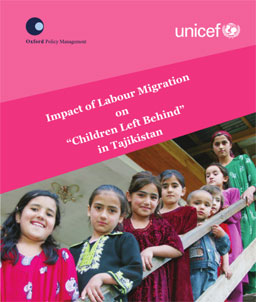Wednesday 14 December 2011
Negative Impact of Labour Migration on Tajik Families
Keywords:
(Press release) – A new report from the United Nations Children’s Fund (UNICEF) on labour migration from Tajikistan shows that many children left behind are exposed to bullying and suffer from depression as well as increased aggression and rebellion.

- Impact of labour migration on “Children left behind” in Tajikistan
This study was undertaken by UNICEF in order to shed light on the impact of migration on the well-being of children as it relates to health, education, economic activity, and psycho-social variables, using a child rights-based approach. The study has revealed mixed positive and negative impacts of migration on children and women depending on whether they belong to migrant, non-migrant or abandoned households.
The report, released today, looks at the impact on health, education, well-being and economic activity of labour migration in Tajikistan, where dramatic social and economic changes since the end of the Soviet Union and national independence have led to widespread migration.
Remittances from Tajik migrants living in other countries have become vital to boosting economic growth and reducing poverty, UNICEF said, noting in a press release that the report sheds light on many of the downsides of migration.
A third of migrant families interviewed for the report describe the overall impact as “negative,” and almost the same amount are “neutral,” with just over a third “very positive” or “positive.”
Some 48% of non-migrant households also describe the impact as negative, with abandoned family members back in Tajikistan among those least likely to see a positive impact.
“A significant number” of migrant parents also say they are unhappy about having to migrate, despite the additional earnings they usually acquire in another country, which helps to pay for improved health care, education, nutrition and housing.
Many children in the study were found to have been strongly affected by their parents’ migration, exhibiting symptoms of depression, withdrawal, increased aggression and greater rebelliousness.
The children were also more likely to be exposed to bullying because of the lack of protective parental figures and teased by others as “forgotten”.
Laylee Moshiri (لیلی مشیری), UNICEF’s representative in Tajikistan, said the report’s policy recommendations are aimed at lessening the social impact of migration on children left behind.

